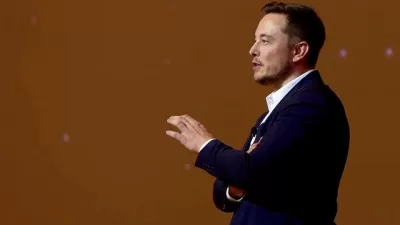The "Loop" is the latest manifestation of Elon Musk's transportation fantasies, offering "personal rapid transit" to and from anywhere in Los Angeles without any congestion or cost.

Earlier in May, Elon Musk threw a party, of sorts, to showcase his ideas for tunneling his way out of traffic in Los Angeles. The idea is now called Loop—and it's a little bit Boring Company and a little bit Hyperloop. It promises $1 rides for everyone and ten minute rides from LAX to Dodger Stadium. Musk has already built a prototype tunnel.
An opinion piece by David Dayen does a thorough job of dismantling the fantasy that Elon Musk has discovered a solution to congestion. The headline of the article compares a transportation future designed by Musk to the lines at Disneyland.
But first, you'd have to get your car into the tunnel. Musk's design fails to solve that fundamental challenge of all PRT systems — which is why practically none have been built. Worse, Musk wants to cripple the already gridlocked above-ground network, also known as roads, in service to his subterranean fantasy.
Then there's the obvious self-interest in the proposed network.
If the Loop has too few stops, the result is an inefficient, relatively useless subway. Musk's initial map of 60 miles of tunnels had only 23 stops and seemed to mainly be designed for his personal comfort. It conveniently includes his own commute from Bel-Air to Hawthorne, a few sports venues, a couple airports for when he has to fly, and pretty much nowhere that the bulk of the city lives or works.
Then comes a warning, couched in an appeal for expertise and collaboration to run the show:
This kind of boondoggle is what you get when a libertarian billionaire tries to solve a problem that requires collective action and shared rides.
Another article by Adam Popescu is less pointed in its criticisms, but focuses on the Loop reveal event and the actions of Musk, the Boring Company, and the city of Los Angeles in circumventing environmental review and public engagement.
FULL STORY: Enjoy the lines at Disneyland? You'll love Elon Musk's idea for transit

Maui's Vacation Rental Debate Turns Ugly
Verbal attacks, misinformation campaigns and fistfights plague a high-stakes debate to convert thousands of vacation rentals into long-term housing.

Planetizen Federal Action Tracker
A weekly monitor of how Trump’s orders and actions are impacting planners and planning in America.

Chicago’s Ghost Rails
Just beneath the surface of the modern city lie the remnants of its expansive early 20th-century streetcar system.

MTA Poised to Break Ridership, On-Time Service Records
New York City’s transit system saw strong increases in ridership and improvements in service quality in the first half of 2025.

Bend, Oregon Zoning Reforms Prioritize Small-Scale Housing
The city altered its zoning code to allow multi-family housing and eliminated parking mandates citywide.

Amtrak Cutting Jobs, Funding to High-Speed Rail
The agency plans to cut 10 percent of its workforce and has confirmed it will not fund new high-speed rail projects.
Urban Design for Planners 1: Software Tools
This six-course series explores essential urban design concepts using open source software and equips planners with the tools they need to participate fully in the urban design process.
Planning for Universal Design
Learn the tools for implementing Universal Design in planning regulations.
planning NEXT
Appalachian Highlands Housing Partners
Mpact (founded as Rail~Volution)
City of Camden Redevelopment Agency
City of Astoria
City of Portland
City of Laramie



























